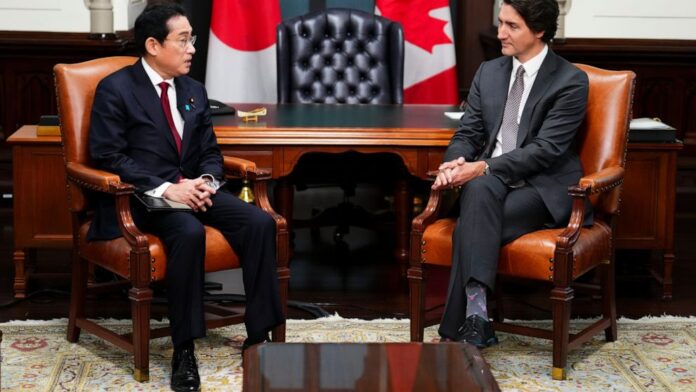OTTAWA, Ontario — Japanese Prime Minister Fumio Kishida expects Canada to help his country wean itself off fossil fuels from countries like Russia.
Kishida is in Ottawa on Thursday for his first visit as Japanese leader, as part of a tour of other Group of Seven countries.
Japan holds the G-7 presidency this year and is expected to host meetings with the leaders of some of the world’s wealthiest countries. The group includes the UK, Canada, France, Germany, Italy, Japan and the United States and the European Union.
Tokyo plans to use the presidency to coordinate with other states on economic management and to punish Russia for its invasion of Ukraine.
Kishida arrived in Ottawa from London late Wednesday and is expected to travel to Washington, DC on Thursday.
The visit comes at a time of geopolitical alignment between Japan and Canada, both of which have recently highlighted China as a threat to regional stability.
Kishida’s arrival marks the first visit to Canada by an Asian leader since Ottawa launched its Indo-Pacific strategy last November, which called for closer ties with countries capable of offsetting Beijing’s influence.
A new Japanese defense strategy unveiled last month included working with allies to repel threats from North Korea and China, and made it legal for Japan to conduct military strikes against enemy bases. Tokyo increases its military spending by 26% in just one year.
Meanwhile, a regional trade agreement launched in 2018 has helped both countries expand trade with each other’s markets. Under the Comprehensive and Progressive Trans-Pacific Partnership, Canada has increased its exports of pork and oil to Japan while importing more Japanese machinery and auto parts.
“Trade between our two countries is booming,” Prime Minister Justin Trudeau said at a luncheon Thursday he hosted for Kishida and company leaders.
“We share a vision for peace and prosperity on both sides of the Pacific.”
Kishida told guests that liquefied natural gas will play a “critical role” in Japan’s energy transition and that Canada’s looming LNG export terminal is an example of how Ottawa can help in many ways.
“Regarding science, technology and innovation (digital transformation) and start-ups, I am very interested in further strengthening the cooperation between industry, government and academia in both countries,” Kishida told attendees in Japanese through an English interpreter.
“Nuclear power will also play a key role and we look forward to working together to make the nuclear supply chain more resilient.”
The Canadian government will lead a trade delegation to Japan this fall, Trudeau said, and Japanese companies interested in mining and battery components for electric vehicles plan to visit Canada in the spring.
















